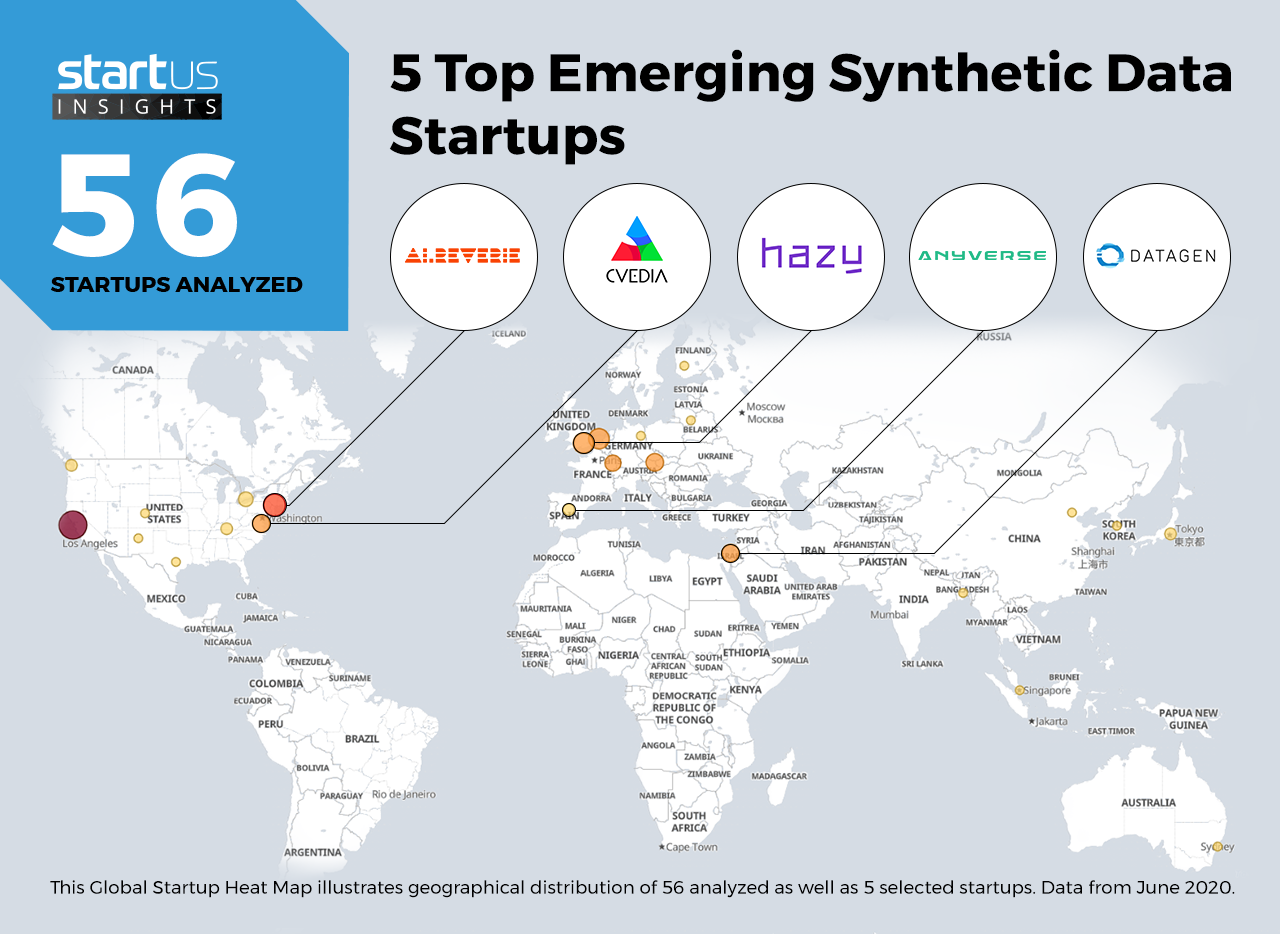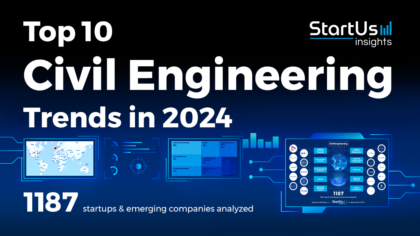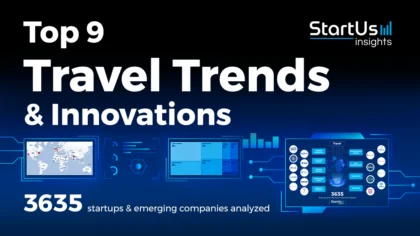Staying ahead of the technology curve means strengthening your competitive advantage. That is why we give you data-driven innovation insights. This time, you get to discover five hand-picked synthetic data startups.
Out of 56, the Global Startup Heat Map highlights 5 Top Synthetic Data Startups
The insights of this data-driven analysis are derived from the Big Data and Artificial Intelligence (AI)-powered StartUs Insights Discovery Platform, covering 2 093 000+ startups and scaleups globally. The platform gives you an exhaustive overview of emerging technologies and relevant startups within a specific field in just a few clicks.
The Global Startup Heat Map below reveals the distribution of the 56 exemplary startups and scaleups we analyzed for this research. Further, it highlights five synthetic data startups that we hand-picked based on criteria such as founding year, location, funding raised, and more. You get to explore the solutions of these five startups and scaleups in this report. For insights on the other 51 synthetic data solutions, get in touch.
DataGen develops Human-Focused Datasets for AI Training
Artificial intelligence projects depend on large, labeled data sets. Although there are advancements in neural network architectures and training algorithms, they do not solve the data problem. Machine and deep learning models have achieved high accuracy in various fields of biology and medicine. However, most of the potential remains unrealized due to the lack of open data. This is seen in situations where medical and clinical records are unavailable due to their confidentiality. Healthcare synthetic data generates human-focused data to overcome this issue.
Israeli startup Datagen provides a sophisticated, photorealistic 3D reconstruction of human hands, face, body, and eyes. The startup’s technology recognizes gestures as well as real-world hand-to-object, and hand-to-hand interactions. To create human-focused data its simulator blends computer graphics and data generation technology. Additionally, the simulated data incorporates natural 3D skeletal tracking that enables interaction in a virtual reality (VR), augmented reality (AR), or Internet of Things (IoT) environment.
Cvedia provides Photo-Realistic Simulations
AI is easier to supplement and modify to increase the effectiveness of trained models. Effective training of neural networks for processing video information requires large arrays of images with real annotations. Access to these arrays is a major obstacle for most companies that are trying to enter the market. This is why startups offer diverse, high-quality, and labeled images for the training and validation of visual AI solutions.
US-based startup Cvedia develops a high-fidelity simulator to generate entropic scenes, conditions, and metadata to enable real-time simulations. The startup’s proprietary tools create synthetic images that simplify the sourcing of large volumes of labeled, real, and visual data. Moreover, the simulation platform employs multiple sensors to synthesize photo-realistic environments, resulting in empirical dataset creation.
Hazy offers Financial Synthetic Data
Synthetic data enables data scientists and developers to train models for projects in areas where big data is not usable. For example, the FinTech industry prevents the collection of real user data as there is a high risk of financial fraud. Although banks are required to share such data through open banking protocols, synthetic data is better suited for the task. Moreover, the use of synthetic finance data is safer and falls outside the scope of regulations such as GDPR and CCPA.
Hazy is a UK-based startup that creates synthetic data from customers’ raw data. The startup’s solution removes governance, security, and privacy concerns from data provisioning. This allows companies to speed up analytics workflows and deliver products to market more quickly. Besides, Hazy enables financial institutions to monetize customer data without selling customer identities, improving customer experience and revenue flow.
AI.Reverie facilitates Data Labeling
The use of synthetic data for data labeling and benchmarking improves the accuracy of neural networks. Additionally, this process enables an active reduction in distortion and reduces the amount of necessary real data, saving time and capital. For small companies, access to labeled training datasets is limited, expensive, or unavailable. To tackle this issue, startups develop synthetic data generation tools that enable companies to create data labeling solutions for training and even pre-training machine learning models.
US-based startup AI.Reverie offers end-to-end solutions for data generation, labeling, and benchmarking. The startup’s data labeling technology generates synthetic data to train computer vision algorithms for activity recognition, object detection, and segmentation. Additionally, the benchmarking framework splits the real-world labeled dataset to determine the outcome of the real-world baseline. This results in an overall increase in the performance of the algorithm, improving classification accuracy.
ANYVERSE – Sensor-Specific Data
Synthetic data modeling uses complex boundary cases and offers an accurate synthesis of the client’s entire target system. Besides, this leads to the generation of data sets that are GDPR compliant and with minimal image bias. This allows companies to mitigate expensive data acquisition processes and accelerate model training. Some startups offer platforms that allow users to define their target system to generate data, improving use-case-specific data easily accessible and accurate.
ANYVERSE is a Spanish startup that simulates multiple scenarios to create synthetic datasets using raw sensor data, image processing, and LiDAR for the automotive industry. The startup’s solution defines the number of variation cycles, ground-truth data, and channel outputs to create synthetic data. This allows automotive original equipment manufacturers (OEMs) and suppliers to simplify deep learning training for advanced perception models.
Discover more Synthetic Data Startups
Startups such as the examples highlighted in this report focus on accurate and bias-free training datasets, data labeling, data compliance as well as machine learning and artificial intelligence. While all of these technologies play a major role in advancing the industry, they only represent the tip of the iceberg. To explore synthetic data solutions in more detail, let us look into your areas of interest. For a more general overview, download one of our free Industry Innovation Reports to save your time and improve strategic decision-making.








